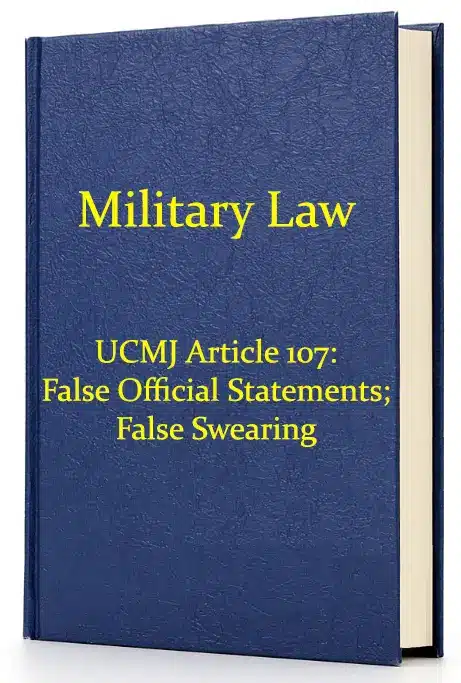The MCM states under Article 107 (False Official Statements; False Swearing), any service member may be prosecuted for false official statements if they:
-
sign any false record, return, regulation, order, or other official document, knowing it to be false; or
-
make any other false official statement, knowing it to be false.
A service member may be prosecuted under Article 107 for false swearing if they:
-
take an oath that is administered in a matter in which such oath is required or authorized by law, and is administered by a person with authority to do so; and
-
upon such oath, makes or subscribes to a statement; if the statement is false and at the time of taking the oath, the person does not believe the statement to be true.
To be convicted for false official statements, the prosecution must demonstrate the following:
-
the accused signed a specific official document or made a specific official statement;
-
the document or statement was false in certain particulars;
-
the accused knew it to be false at the time of signing it or making it, and
-
the false document or statement was made with the intent to deceive.
A conviction for false swearing requires the prosecution to prove:
-
the accused took an oath or equivalent;
-
the oath or equivalent was administered to the accused in a matter in which such oath or equivalent was required or authorized by law;
-
the oath or equivalent was administered by a person having authority to do so;
-
upon this oath or equivalent, the accused made or subscribed to a specific statement;
-
the statement was false; and
-
the accused did not then believe the statement to be true.
Understanding Article 107 (False official statements; false swearing) of the UCMJ
False Official Statements
Statements may be made orally or in writing, including records, returns, regulations, orders, or other documents. Official statements affect military functions, encompassing matters within the jurisdiction of the military departments and services. There are three broad categories of official statements under this offense: where the accused makes a statement while acting in the line of duty or where the statement bears a clear and direct relationship to the accused’s official responsibilities; where the accused makes a statement to a military member who is carrying out an army duty at the time the statement is made; or where the accused makes a statement to a civilian who is necessarily performing a military function at the time the accused makes the statement.
The false representation must be made with the intent to deceive, and the accused must be aware the representation is false. I don’t think the false statement should materialize the issue inquiry. If the falsity concerns a material matter, it may be considered as evidence of the intent to deceive. At the same time, to execute immateriality may tend to show an absence of this intent. The rank or status of any person intended to be deceived is immaterial if that person was authorized to execute a particular duty to require or receive the statement from the accused. The Government may be the victim of this offense.
False Swearing
False swearing is the making, under a lawful oath or equivalent, of any untrue statement, oral or written, not believing the statement to be true. Unlike a false official statement, the statement is not required to be made with the intent to deceive or be official.
Maximum Possible Punishment for Violations of Article 107
Service members convicted of Article 107 for false official statement violations face a maximum punishment of dishonorable discharge, forfeiture of all pay and allowances, and five years’ confinement.
Those convicted of Article 107 violations of false searing face the maximum possible punishment of dishonorable discharge, forfeiture of all pay and allowances, and confinement for three consecutive years.
How do you defend against Article 107 False Official Statements; False Swearing charges?
When facing the combined resources of the military and the current cultural climate, you need to be prepared to defend your career and your freedom. Crisp and Associates, LLC has a team of experienced trial attorneys who have won these cases. This team includes the firm’s founder, Jonathan Crisp, a highly respected former Army JAG with over 23 years of experience in military law and a sought-after speaker and lecturer on military law. Donald Gordon has litigated cases before the Discharge Review Board, the Board for Correction of Military Records, and the Board for Correction of Naval Records regarding various matters and a diverse background of clients.
If you or someone you know is facing Article 107 charges for False Official Statements False Swearing, you must immediately speak with a Military defense attorney.


